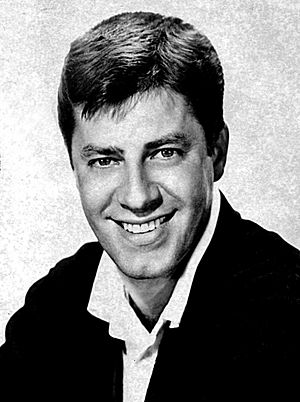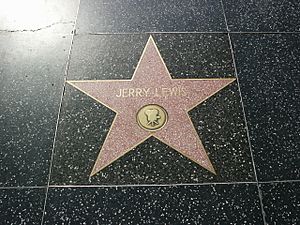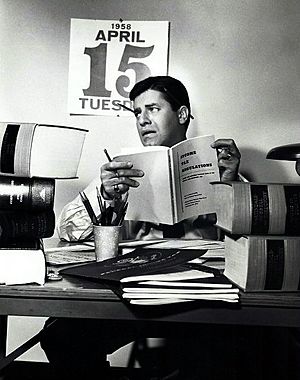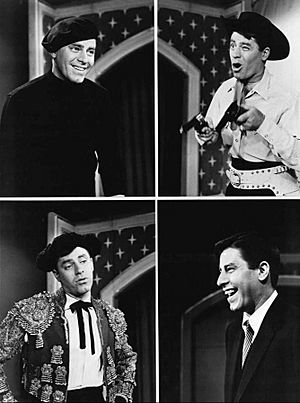Jerry Lewis facts for kids
Quick facts for kids
Jerry Lewis
|
|
|---|---|

Lewis in the 1960s
|
|
| Born |
Joseph Levitch
March 16, 1926 Newark, New Jersey, U.S.
|
| Died | August 20, 2017 (aged 91) Las Vegas, Nevada, U.S.
|
| Cause of death | Cardiovascular disease |
| Resting place | Cremated, ashes given to family |
| Occupation |
|
| Years active | 1946–2017 |
| Spouse(s) |
Patti Palmer
(m. 1944; div. 1980)SanDee Pitnick
(m. 1983) |
| Children | 7, including Gary Lewis |
| Signature | |
 |
|
Jerry Lewis (born Joseph Levitch, March 16, 1926 – August 20, 2017) was a very famous American comedian, actor, and film director. He was known for his funny, physical comedy, often called slapstick humor. People even called him the "King of Comedy"!
Jerry Lewis was part of a super popular comedy team called Martin and Lewis with singer Dean Martin. They worked together from 1946 to 1956. After their team split up, Jerry Lewis became a big solo star in movies. He also performed in nightclubs, on TV shows, and sang in music albums.
Outside of his amazing career, Jerry Lewis spent 60 years helping to raise money for muscular dystrophy research. He was the main spokesperson for the Muscular Dystrophy Association. For 44 years, he hosted a live TV show called The Jerry Lewis MDA Labor Day Telethon every Labor Day weekend to raise money.
Jerry Lewis was one of the most successful performers ever. His movies earned over $800 million around the world! He was loved for his special way of doing both comedy and serious acting. From 1951 to 1965, he was voted Hollywood's top box-office star, first with Dean Martin, and later on his own.
Contents
Life and Career of Jerry Lewis
Jerry Lewis was born in Newark, New Jersey. He started performing when he was just five years old! He often performed with his parents in the Borscht Belt area of New York. Even as a teenager, he was a prankster. He dropped out of Irvington High School in tenth grade. During World War II, he couldn't join the military because of a heart condition.
The Martin & Lewis Comedy Team
Jerry Lewis first became famous as part of the Martin & Lewis team with singer Dean Martin. They worked together for ten years. They were a huge hit on stage, radio, television, and in movies. Their films were very successful and loved by audiences.
The partnership ended on July 24, 1956, which was their 10th anniversary. Both Martin and Lewis went on to have very successful solo careers. They didn't often talk about why they split up, but they were sometimes seen at the same public events.
Jerry Lewis as a Director
Jerry Lewis directed many of his own movies. He was a pioneer in filmmaking! He was the first director to use video cameras along with movie cameras. This helped him check scenes right away. Movie film takes time to develop, but videotape can be watched instantly. This saved a lot of time and work if a scene needed to be filmed again. Other directors quickly started using his smart technique, and it's still used today!
During the 1970s, Jerry Lewis's movies became less popular. He took a break from acting and directing. But in the 1990s, he returned to performing on stage. He continued to perform into the 2000s.
Jerry Lewis's Legacy and Influence

Jerry Lewis is known as a comedy genius. He influenced many comedians, writers, performers, and filmmakers who came after him. Many people see him as the link between old-fashioned Vaudeville comedy and modern comedy. He was one of the most creative and important comedians of his time.
Jerry Lewis's comedy style was very physical and expressive. He was famous for his unique voice, funny facial expressions, and amazing physical stunts. His improvisations (making things up on the spot) and ad-libbing (speaking without a script), especially in nightclubs and early TV, were revolutionary. He had a raw, energetic style that made him stand out in the world of comedy.
Martin and Lewis Films
Here are some of the movies Jerry Lewis made with Dean Martin:
| Year | Film | Role | Notes |
|---|---|---|---|
| 1949 | My Friend Irma | Seymour | |
| 1950 | My Friend Irma Goes West | Seymour | |
| 1950 | At War with the Army | PFC Alvin Korwin | |
| 1951 | That's My Boy | 'Junior' Jackson | |
| 1952 | Sailor Beware | Melvin Jones | |
| 1952 | Jumping Jacks | Hap Smith | |
| 1952 | Road to Bali | 'Woman' in Lala's Dream | Cameo |
| 1952 | The Stooge | Theodore Rogers | Also uncredited writer |
| 1953 | Scared Stiff | Myron Mertz | |
| 1953 | The Caddy | Harvey Miller, Jr. | |
| 1953 | Money from Home | Virgil Yokum | |
| 1954 | Living It Up | Homer Flagg | |
| 1954 | 3 Ring Circus | Jerome F. Hotchkiss | |
| 1955 | You're Never Too Young | Wilbur Hoolick | |
| 1955 | Artists and Models | Eugene Fullstack | |
| 1956 | Pardners | Wade Kingsley Sr/Wade Kingsley Jr. | |
| 1956 | Hollywood or Bust | Malcolm Smith |
Jerry Lewis Solo Films
Here are some of the movies Jerry Lewis starred in or directed on his own:
| Year | Film | Role | Notes |
|---|---|---|---|
| 1957 | The Delicate Delinquent | Sidney L. Pythias | Also producer |
| 1957 | The Sad Sack | Private Meredith Bixby | |
| 1958 | Rock-A-Bye Baby | Clayton Poole | Also producer |
| 1958 | The Geisha Boy | Gilbert Wooley | Also producer |
| 1959 | Don't Give Up the Ship | John Paul Steckler I, IV, and VII | |
| 1959 | Li'l Abner | Itchy McRabbit | Cameo |
| 1960 | Visit to a Small Planet | Kreton | |
| 1960 | The Bellboy | Stanley / Himself | Also director, writer and producer |
| 1960 | Cinderfella | Cinderfella | Also producer |
| 1961 | The Ladies Man | Herbert H. Heebert / Mama Heebert | Also director, writer and producer |
| 1961 | The Errand Boy | Morty S. Tashman | Also director and writer |
| 1962 | It's Only Money | Lester March | |
| 1963 | The Nutty Professor | Professor Julius Kelp / Buddy Love / Baby Kelp | Also director and writer |
| 1963 | It's a Mad, Mad, Mad, Mad World | Man Who Runs Over Hat | Cameo |
| 1963 | Who's Minding the Store? | Norman Phiffier | |
| 1964 | The Patsy | Stanley Belt / Singers of the Trio | Also director and writer |
| 1964 | The Disorderly Orderly | Jerome Littlefield | Also executive producer |
| 1965 | The Family Jewels | Willard Woodward / James Peyton / Everett Peyton / Julius Peyton / Capt. Eddie Peyton / Skylock Peyton / Bugsy Peyton | Also director, writer and producer |
| 1965 | Boeing Boeing | Robert Reed | |
| 1966 | Three on a Couch | Christopher Pride / Warren / Ringo Raintree / Rutherford / Heather | Also director and producer |
| 1966 | Way...Way Out | Pete Mattermore | |
| 1967 | The Big Mouth | Gerald Clamson / Syd Valentine | Also director and producer |
| 1968 | Don't Raise the Bridge, Lower the River | George Lester | |
| 1969 | Hook, Line & Sinker | Peter Ingersoll / Fred Dobbs | Also producer |
| 1970 | One More Time | Offscreen voice of the bandleader | Also director, writer and producer |
| 1970 | Which Way to the Front? | Brendon Byers III | Also director and producer |
| 1972 | The Day the Clown Cried | Helmut Doork | Also director and writer; uncompleted/unreleased |
| 1980 | Hardly Working | Bo Hooper | Also director and writer |
| 1982 | Slapstick of Another Kind | Wilbur Swain / Caleb Swain | |
| 1982 | The King of Comedy | Jerry Langford | |
| 1983 | Cracking Up | Warren Nefron / Dr. Perks | Also director and writer |
| 1984 | Retenez Moi...Ou Je Fais Un Malheur | Jerry Logan | |
| 1984 | Par où t'es rentré ? On t'a pas vu sortir | Clovis Blaireau | |
| 1987 | Fight For Life | Dr. Bernard Abrams | Television film |
| 1989 | Cookie | Arnold Ross | |
| 1992 | Mr. Saturday Night | Guest | Cameo |
| 1993 | Arizona Dream | Leo Sweetie | |
| 1995 | Funny Bones | George Fawkes | |
| 2008 | The Nutty Professor | Professor Julius Kelp / Buddy Love (voice) | Direct-to-DVD |
| 2010 | Curious George 2: Follow That Monkey! | Stationmaster (voice) | Direct-to-DVD |
| 2011 | Method to the Madness of Jerry Lewis | Himself | Documentary; also produced |
| 2013 | Até que a Sorte nos Separe 2 | Bellboy | |
| 2016 | The Trust | Stone's Father | |
| 2016 | Max Rose | Max Rose |
Images for kids
-
Lewis with Dean Martin in 1950
-
Lewis as Professor Kelp, with co-star Stella Stevens, in The Nutty Professor (1963)
See also
 In Spanish: Jerry Lewis para niños
In Spanish: Jerry Lewis para niños





